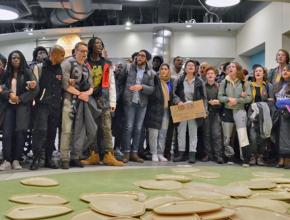Students protest meal-plan profiteering
reports from Madison on student anger with the UW administration.
ON FEBRUARY 13, students at the University of Wisconsin (UW) in Madison protested the latest example of the university putting profits before them: a new meal plan imposed by the administration. Around 100 students gathered in Gordon Commons, one of the campus's largest dining halls, to participate.
The new plan would force incoming freshmen in the fall semester of 2018 to add a minimum of $1,400 to their Wiscard account, to be used exclusively in residence dining halls.
The plan will negatively affect incoming students with dietary restrictions--including those who maintain certain diets for religious reasons--and those who want the autonomy to eat food off campus, which may be more cost-effective. Considering the number of student workers on campus, this price tag would be a burden on many.
In response to the opposition, University Housing Director Jeff Novak said condescendingly that the plan would allow students to "hold themselves accountable" to their budgets. But Novak has also admitted that the meal plan is meant to shore up UW-Madison Dining's declining revenue.

This move was enacted by the campus administration without consulting students, who only became aware of the change from a campus newspaper article after the fact.
THE FEBRUARY 13 protest began with the crowd marching and chanting through Gordon Commons. This aroused attention and led several students to join the rally.
A speak-out was held after a lap around the Commons. Several students voiced their anger, provided statistics and read testimonials from a petition against the meal plan with more than 3,500 student signatures.
One speaker, Rena Newman, and organizer of the event, said: "The $1,400 minimum deposit requires students to fork over money that they don't have and requires students with dietary and medical restrictions to pay for food they can't eat. The plan removes the agency and autonomy of all students to decide when and where and how they eat."
Other speakers gave several motivations to get plugged in to activism at different levels of involvement, including participating in further disruptive actions, signing petitions and contacting administrators.
The crowd was then asked to link arms, chant and block the entrance to Gordon Hall. At one point, several members of the blockade began throwing trays from the dining hall in protest, ramping up the energy of the action. University officials stood by, but did not intervene.
The crowd held this wall for about 15 minutes, until the action came to an end. There was a subsequent meeting to discuss further action.
It's clear that students want to fight for a better future for incoming freshmen and resist the administration's claims that this plan doesn't affect them. The protest shows a desire to build solidarity across a broad front of campus organizations and individuals to combat not only of the meal plan, but the profit-seeking efforts of UW in general.


